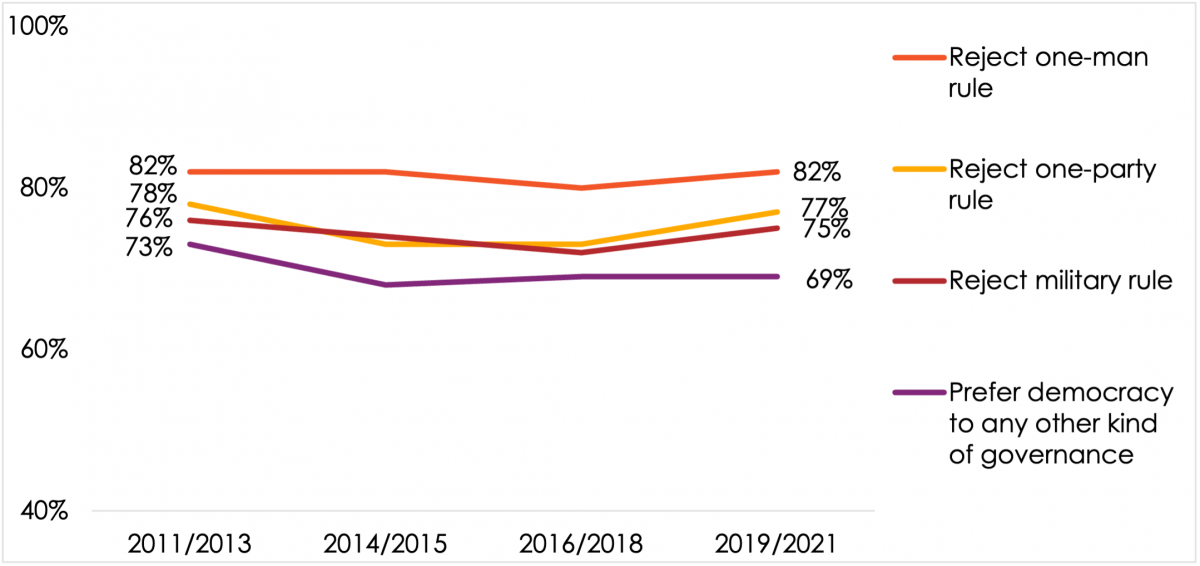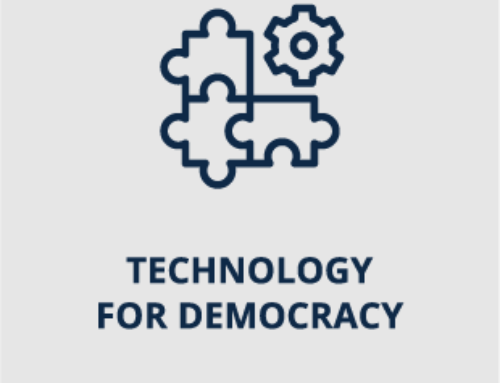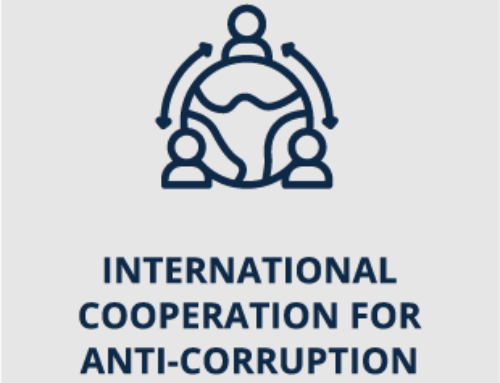The first in Afrobarometer’s special African democracy summit series.
Originally published on the Washington Post Monkey Cage blog, where our regular Afrobarometer series explores Africans’ views on democracy, governance, quality of life, and other critical topics.
By E. Gyimah-Boadi and Joseph Asunka
In December, the Biden administration will gather government, private sector and civil society leaders in a global Summit for Democracy. The summit will be a forum at which institutions and countries will discuss democratic aspirations, confront threats faced by democracies around the world, and establish “an affirmative agenda for democratic renewal.”
Afrobarometer will participate in the summit, bringing the perspectives of ordinary Africans to the table. The quality of democracy and governance across the continent are Afrobarometer’s core themes, so we have a lot to say, especially since we just completed 48,084 face-to-face interviews in 34 countries in our eighth survey round (2019-2021). In anticipation of the summit, we are launching a special “African democracy summit series” to report some of our most important new findings.
Today we start with the basics: Do Africans (still) want democracy? Do they think they’re getting it?
In the coming weeks we will follow with posts on corruption and democratic commitment, term limits, China’s influence, the impact of the COVID-19 pandemic, and related topics. We will also examine several case studies, highlighting countries that have been gaining or losing ground, democratically speaking.
Africans’ resilient democratic aspirations
Over the past decade, democracy watchers have been alarmed by declining trends in the status of democracy in Africa. Some governments have taken advantage of the pandemic to limit freedoms, restrict fair campaigning, or postpone elections. Activists are particularly wary of the possibility that supposedly temporary rollbacks in hard-won governance reforms could become permanent.
But for the most part, African citizens are committed to democracy and democratic institutions. Across 30 countries that Afrobarometer has surveyed consistently since Round 5 (2011-2013), most indicators remain strong and quite steady.
Seven in 10 Africans (69%) say that “democracy is preferable to any other kind of government.” While this is down modestly from 73% a decade ago, as you can see in the figure below, more specific indicators seem to affirm popular commitment to democracy. Large and steady majorities consistently reject authoritarian alternatives, including military rule (75%), one-party rule (77%), and one-person rule (82%).
Figure 1: Preference for democracy and rejection of authoritarian alternatives | 30 countries | 2011-2021
Support for core democratic institutions, such as multiparty competition (63%), parliamentary oversight of the president (67%) and presidential term limits (77%), is also strong and consistent, as you can see in the next figure.
Figure 2: Support for democratic norms and institutions | 30 countries | 2011-2021
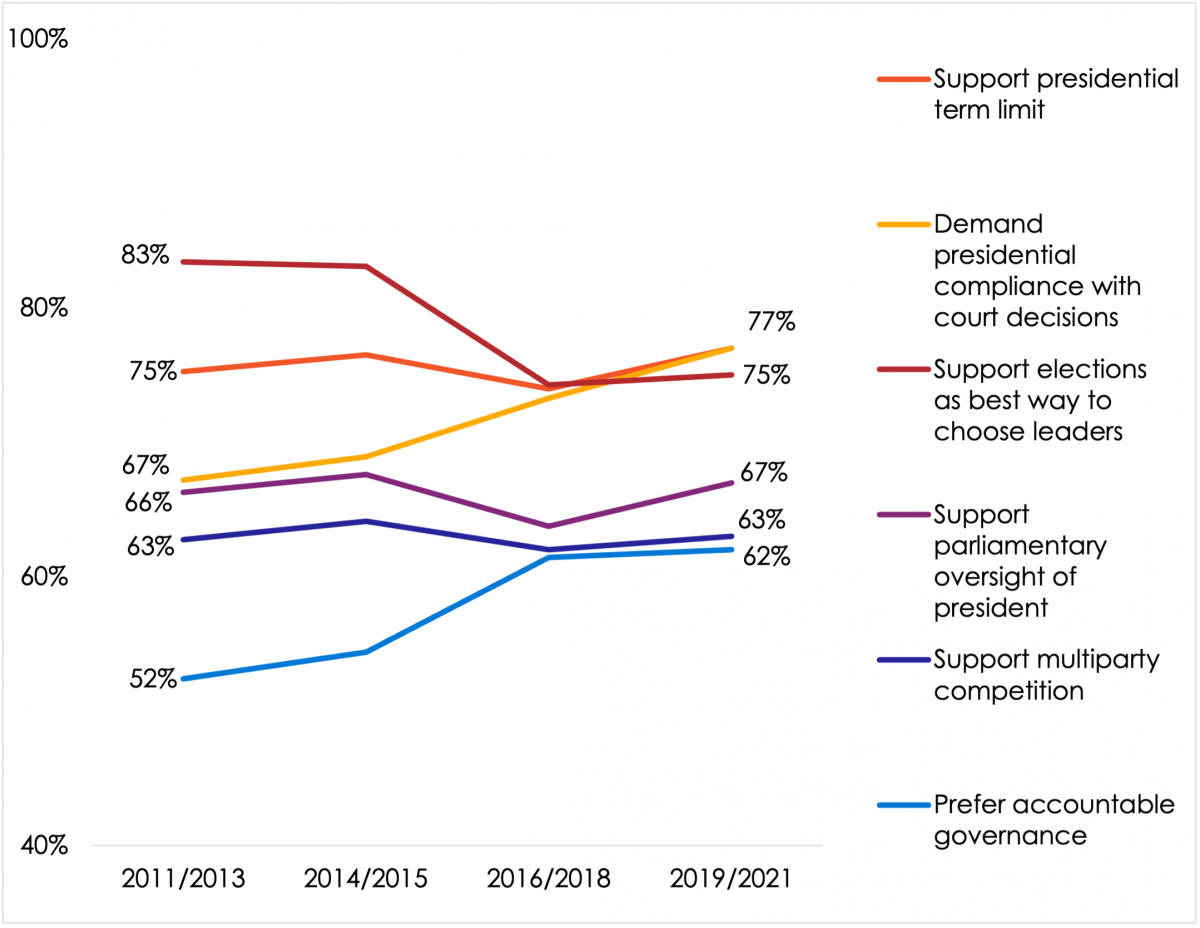
Commitment to multiparty elections as the best system for selecting leaders, while still strong at 75%, has fallen by 8 percentage points over the past decade. This decline may reflect real disillusionment with electoral processes that are often torn by violence and produce contested results. A growing number of people may also be recognizing that elections, especially poor-quality ones, are not enough to guarantee democracy and better governance, and that a healthy democracy must include such other features as government accountability and responsiveness and citizen participation .
That’s what we can conclude from increases in popular demand for accountability and the rule of law. More than three-quarters (77%) of Africans now agree that their president “must always obey the laws and courts” even if s/he “thinks they are wrong,” up 10 points over the past decade. And nearly two-thirds (62%) say it is more important for a government to be accountable to the people than to ‘’get things done,” up from 52% in 2011/2013. Considering the scope of needs that people want their governments to address, this finding, more than any other, suggests an important deepening of popular democratic commitment.
The reality: A “democratic disappointment” gap
To what extent does political reality align with Africans’ aspirations? Afrobarometer findings suggest that it is falling short of expectations.
Across the continent, recent years have been marked by democratic highs — such as Malawi’s re-running of its flawed 2019 presidential election, a recent ruling-party transition in Zambia, and the ouster of long-serving autocrats in the Gambia, Sudan and Zimbabwe — alongside such lows as coups in Mali and Guinea and attempted coups in Gabon and Niger. But on average, as we have seen in the past, we continue to find that Africans want more democratic and accountable governance than they feel they are getting.
We begin by asking respondents “how much of a democracy” their country is and how satisfied they are with “the way democracy works.” Across 30 countries tracked for the past decade, a slim majority of 52% report that their country is “a full democracy” or “a democracy with minor problems.” That’s roughly the same as the 54% recorded in 2011/2013. But satisfaction is lower, and dropping substantially, from 50% a decade ago to 43% now, as you can see in the figure below.
Figure 3: Supply of democracy | 30 countries | 2011-2021
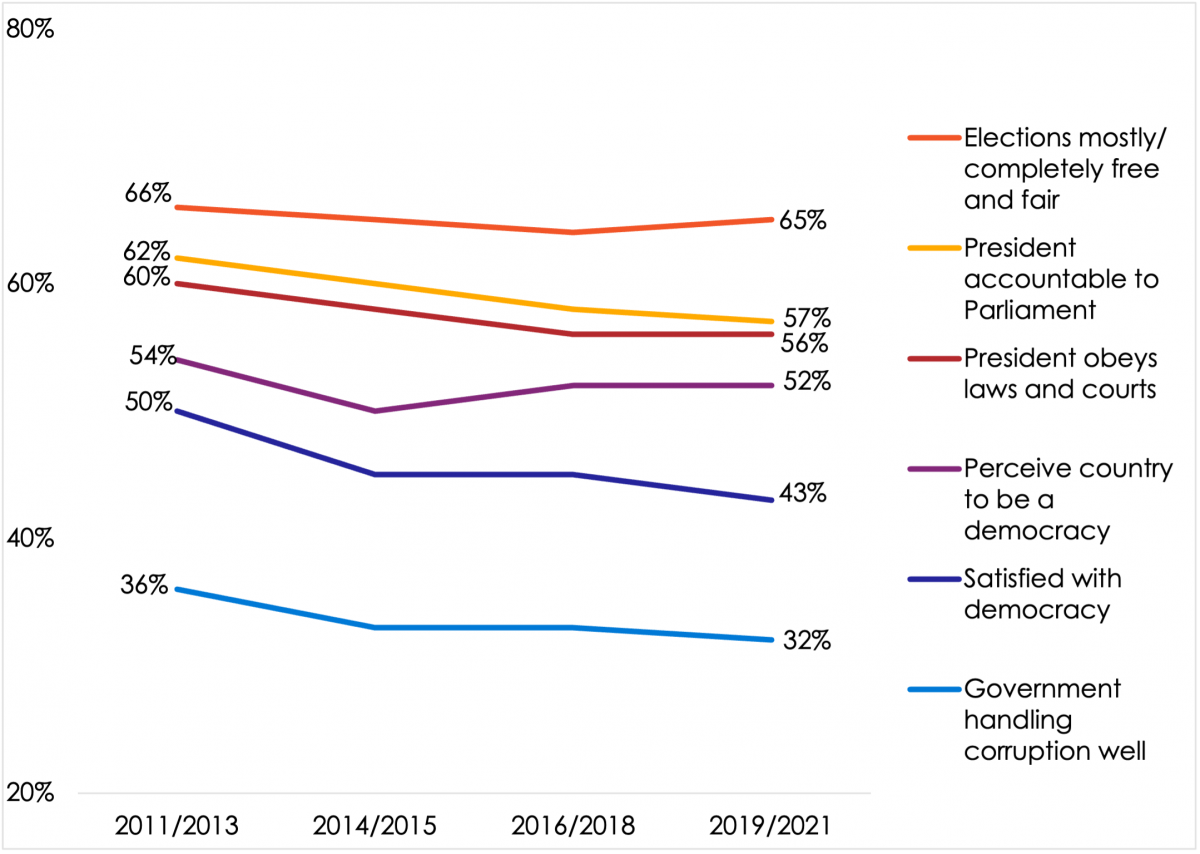
Although ratings of election quality have held steady, a majority of Africans say corruption is getting worse. Just 32% think their government is doing fairly or very well on countering corruption, down from 36% a decade ago. And while we saw that support for the rule of law and presidential accountability to legislatures and the courts is increasing, public confidence that presidents actually obey the laws and courts and submit to parliamentary oversight has declined from 60 and 62%, respectively, to 56 and 57%.
In sum, when we compare indicators of democratic demand and supply, we see that African governments are not meeting their citizens’ aspirations to live in democratic, effective and accountable societies.
Joseph Asunka (@joeasunka) is chief executive officer of Afrobarometer.
E. Gyimah-Boadi (@gyimahboadi) is board chair of Afrobarometer.

